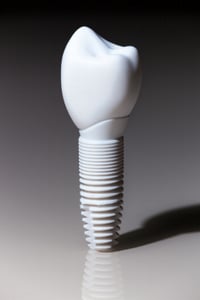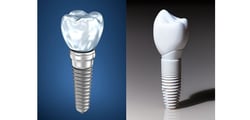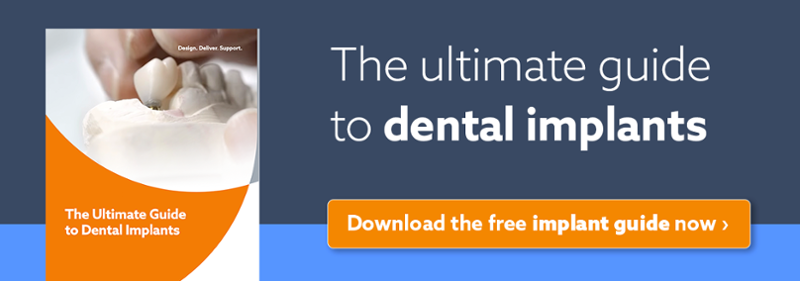Since receiving FDA approval in 2011, zirconia dental implants have been selected by more and more clinicians. These implants have been used in Europe for over a decade and can provide excellent biocompatibility and stability. Although not suitable for everyone, sometimes zirconia dental implants may be better for specific clinical situations.
Pros of choosing zirconia dental implants
- Zirconia is the only viable option for a patient wishing to have dental implants but is concerned about metal-free dentistry. This material is inert and can be a good choice for people with known metal allergies or sensitivities.
- Zirconia implants may be more aesthetically pleasing, eliminating the risk of dark lines around the gingival margin.
- Initially, they were only available as a one-piece implant, but the introduction of two-piece zirconia implants allows for abutments to be fully customized, creating the best outcomes.
- A metal-free zirconia implant could be healthier for the soft tissue because this material retains less plaque and calculus than titanium, especially when a one-piece zirconia implant is selected.
- Zirconia has good flexural strength and is known to be superior to other ceramics in resistance to fracture. Its white color, low modulus of elasticity, and low thermal conductivity have made this material a desirable choice for implant dentistry.
- Clinical studies have shown zirconia to be as good or even better than titanium in terms of osseointegration. This is due to the high level of contact between the implant and the jaw bone, allowing the bone to fuse firmly with the implant, resulting in osseointegration.

Cons of choosing zirconia dental implants
- One of the most significant drawbacks of choosing zirconia dental implants is low-temperature degradation as the product ages. This could potentially result in the material's mechanical properties becoming degraded, reducing the material's strength, density, and toughness. As yet, there haven’t been many clinical studies on the long-term success of these products.
- Most failures recorded for two-piece dental implants were due to aseptic loosening. Due to the lack of research into two-piece zirconia dental implants, some clinicians may prefer to use one-piece dental implants, but the limitations of these systems need to be considered. The options for abutment angulation are reduced, which could compromise the implant's surgical positioning.
- Additionally, positioning a zirconia implant in a less-than-optimal location could adversely affect the material's physical properties.
- Single-piece zirconia dental implants also require a load-free healing period, which can sometimes be tricky to achieve in specific clinical situations.
- Clinical studies into the long-term success and viability of zirconia dental implants are limited since the use of zirconia dental implants is still relatively new. Whereas titanium dental implants have been extensively studied for decades, producing reliable data on their long-term use, studies of zirconia dental implants only assess two or three-year survival rates.
These studies have good results where they exist, with cumulative survival rates equaling those of titanium dental implants.
One interesting point is that excess cement is a frequent complication with titanium dental implants. It can provoke an inflammatory reaction, yet peri-implantitis has not been reported with zirconia dental implants, at least not yet.
It isn’t entirely clear if this is due to zirconia's high biocompatibility or the lack of research into this subject. Patients choosing to have zirconia dental implants should be aware of the possible contraindications of using this material and the potential benefits.
Please be reminded that our experienced technical team is here to assist you should you wish to discuss a case in more detail.
Click here to schedule a consultation with our technical team ›

References:
https://www.researchgate.net/profile/Andrea_Mombelli/publication/303503722_A_systematic_review_of_the_clinical_survival_of_zirconia_implants/links/575002bb08aeb753e7b49dd5/A-systematic-review-of-the-clinical-survival-of-zirconia-implants.pdf
http://onlinelibrary.wiley.com/doi/10.1111/clr.12370/abstract